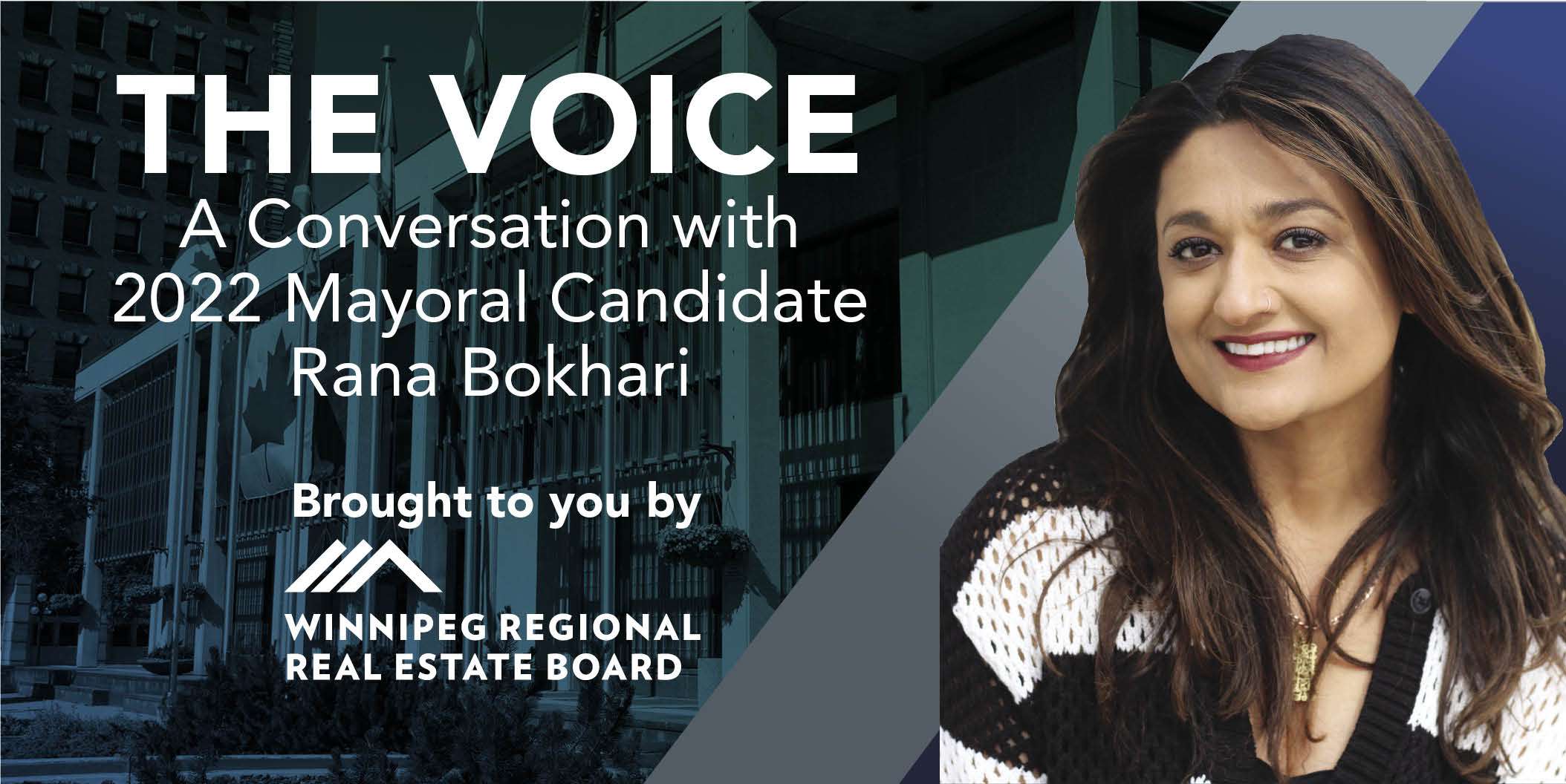The Winnipeg Regional Real Estate Board has a long history of engaging mayoral candidates campaigning to be the next mayor of the City of Winnipeg. Representing over 2,400 REALTOR® Members, the Winnipeg Regional Real Estate Board has a vested interest in connecting with candidates to learn more about their plans on matters that affect the health of the real estate market and homeownership for Winnipeggers.
This is the first of our special weekly feature leading up to election day on October 26 called “A Conversation with 2022 Mayoral Candidates” where candidates share their vision. Scan the QR code above to listen to Rana Bokhari’s podcast interview.
By Rana Bokhari
My vision for Winnipeg is not just about today, but includes the next seven generations of Winnipeggers.
If we want a sustainable, prosperous and revitalized community, we need to pay attention to what the city will look like in the future. The demographics of Winnipeg will continue to change with an increase in newcomers, youth, and one of our greatest unrealized assets, Indigenous youth.
A city that retains people must ensure that Winnipeg is affordable, salaries and wages keep pace with the cost of living, and must create space for skills and development, encouraging entrepreneurship that reflects current trends. I am committed to public engagement with youth to ensure we hear their voices as we make decisions for the future.
Winnipeg is in the centre of the continent, and so should be the centre of numerous industries. Attracting investment is important to ensure we are able to drive our economy forward in a way that makes a sustainable impact on our city. This includes continued partnerships with both the private and public sectors with a goal of diversifying industry.
Winnipeg is already known for its vibrant arts and culture scene, so focusing on the arts as an industry is a large opportunity for Winnipeg. Continued growth for new media, including digital imaging, animation and special effects, interactive games and audio/visual production, should happen here. Green energy and technology is another area in which Winnipeg and Manitoba should be world leaders, and we need to continue to support that by ensuring Winnipeg is a great place to live, work and play. Economic development in Winnipeg must also prioritize equity, inclusion and sustainability.
There are several steps we can take to address the chronic shortage of residential dwelling units in Winnipeg. The first is to do what we can to reduce red tape, especially in the conversion of empty office space into living space. There is a tremendous opportunity for this, especially downtown, and especially for non-Western family spaces. We have numerous refugees, multigenerational families, and immigrant families who are here or are coming to Winnipeg and we need to be ready. Having more living spaces downtown that are close to services and work for large families is key.
Other things we can do is encourage building up instead of out, incentives to build housing with rents that are geared to income, and a willingness to try bold ideas.
Collaboration with not only the Provincial and Federal governments, but also with First Nations and Indigenous leadership, is key to supporting growth and enabling infrastructure investments.
Within my first 90 days in office, I will work towards building long-lasting relationships based on respect and common ground with all levels of government. At a municipal level, I am committed to ensuring that council and EPC is not divided by design under the EPC plus-two governance model. I acknowledge that the current system is archaic and makes it difficult for non EPC-members to gain policy-making traction and input. As mayor, I will be committed to ensuring that there is transparency of information required for critical debate.
Simply put, I will hit the benchmarks that are already in place to move key projects that sustain delivery of core civic services ahead faster. There are already numerous action plans and studies that council has ignored that already come with deadlines. One of them is the city’s Active Transportation Plan, which was adopted in 2015 with 2-, 5-, and 10-year benchmarks, and then subsequently ignored. Not a single target has been achieved there. We already have the strategies in place, so I’d like to do a quick review, adjust timelines where necessary, and then hit them. Period.
Bio: Rana was born in Winnipeg and went to the University of Manitoba and completed a law degree. She is a practicing lawyer with her own firm, Bokhari, Smith and Walker, where she specializes in helping Indigenous Peoples and marginalized communities wade through complicated and barrier-rich legal processes. In her law practice, she leads with her values: justice, fairness and truth. Visit rana4wpg.ca for more.
The Winnipeg Regional Real Estate Board is a non-partisan organization that works with all elected officials in support of our Members and a better Winnipeg for all its citizens. Nothing in the podcast or this publication should be seen as an endorsement of any candidate in Winnipeg’s civic election by the Winnipeg Regional Real Estate Board.
Previous Candidate articles
Rick Shone
Shaun Loney
Jenny Motkaluk
Listen to the Podcast version



